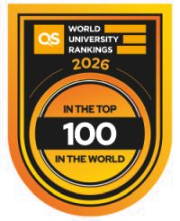University Rankings
Rankings of universities are based on various criteria in research and academic education and allow for a comparison of universities on both the national and international level. In the German university sector, international rankings are gaining importance for e.g. partnership negotiations, students marketing, acquisition of third-party funding, or staff recruitment. Still, university rankings are discussed rather controversially. In particular, the partly intransparent methodology or the general attempt to evaluate universities are criticized.
At regular intervals, Karlsruhe Institute of Technology participates in various university rankings. Among the most important international rankings are the world university rankings of Times Higher Education (THE) and Quacquarelli Symonds (QS) as well as the Academic Ranking of World Universities (ARWU) or Shanghai Ranking.
THE World University Rankings
The annual ranking by the Times Higher Education journal is based on 18 differently weighed indicators in five categories: Teaching, (29,5 %), research environment (29 %), research quality (30 %), internationality (7.5%), and industry (third-party funding and patents: 4%). The evaluation is additionally based on e.g. data from surveys of academics relating to the reputation of the university, general statistics of universities, or the number of publications in expert journals.
THE constantly strives to optimize the methodology of its rankings. In 2015, THE switched from Thomas Reuters (“Web of Science” database) to Elsevier (“Scopus” database) that also collects data on publications in languages other than English. In 2023, the number of indicators was increased from 13 to 18. Moreover, the number of evaluated universities has increased from initially 400 to presently around 1900 universities. These adaptations make a comparison over a longer term very difficult or impossible.
THE World University Rankings by Subject
Apart from the institutional ranking, THE also offers a subject-specific ranking with separate results for eleven subject areas.
KIT in the THE World University Rankings by Subject 2024
| Subject Group | International | National |
|---|---|---|
| Physical Science* | 88 | 8 |
|
Engineering** |
71 | 3 |
| Computer Science*** | 78 | 6 |
*Subjects included: Mathematics and statistics, physics and astronomy, chemistry, geology, earth and marine sciences
**Subjects included: Engineering sciences, electrical engineering, mechanical engineering, civil engineering, and chemical engineering
***Subjects included: Informatics/computer science
QS World University Rankings

The annual QS World University Ranking published by the British company Quacquarelli Symonds Ltd. (QS) features around 1,500 universities worldwide. It emphasizes the indicators academic and employer reputation, faculty student ratio, citations per faculty, international faculty and international students. Three additional criteria were introduced in 2023: sustainability, international research network and employment outcomes. With a weighting of 45 percent, the reputation surveys among academic staff and employers have a strong influence on the ranking result.
Development of KIT Ranking
| 2022 | 2023 | 2024 | 2025 | |
|---|---|---|---|---|
| International | 141 | 119 | 102 | 98 |
| National | 6 | 6 | 6 | 5 |
* Ranking of the institution is listed according to the year of publication
QS World University Rankings by Subject
As regards the subject-specific “QS World University Rankings by Subject,” the overall ranking is based on four indicators, two in the reputation category and two in the research output category. The QS World University Rankings by Subject cover both subject groups and individual subjects.
KIT in the QS World University Rankings by Subject 2025
| Subject Group | International | National |
|---|---|---|
| Natural Sciences | 36 | 2 |
| Engineering Sciences | 53 | 3 |
| Subject | International | National |
| Architecture | 51-100 | 3-5 |
| Biology | 251-300 | 18-23 |
| Business and Management | 301-350 | 10-12 |
| Chemical Engineering | 25 | 1 |
| Chemistry | 55 | 3 |
| Civil Engineering | 51-100 | 2-4 |
| Computer Science | 110 | 4 |
| Economics | 351-400 | 14-16 |
| Electrical Engineering | 62 | 3 |
| Environmental Sciences | 75 | 2 |
| Geology | 51-100 | 1-6 |
| Geophysics | 51-100 | 1-6 |
| Geosciences* | 51-100 | 1-6 |
| Library & Information Management | 51-100 | 1-3 |
| Materials Sciences | 25 | 1 |
| Mathematics | 151-200 | 7-10 |
| Mechanical Engineering | 45 | 3 |
| Physics | 57 | 4 |
| Petroleum Engineering | 19 | 1 |
| Statistics and Operational Research | 51-100 | 5-6 |
*QS: Earth & Marine Science
Academic Ranking of World Universities
Since 2009, the Academic Ranking of World Universities (ARWU) has been published annually by the Shanghai Ranking Consultancy. The ranking is based on six differently weighed factors: The number of published articles per subject, citations, international co-publications, publications in international top journals, and the number of research award winners among the scientific staff and graduates.
Based on these factors, the 1000 best universities worldwide are determined. Only the first 100 universities are ranked in fixed positions, the remaining 900 are assigned to ranking groups.
Development of KIT Ranking
| 2022 | 2023 | 2024 | 2025 | |
|---|---|---|---|---|
| International | 201-300 | 301-400 | 201-300 | 301-400 |
| National | 10-19 | 20-24 | 12-22 | 22-27 |
Global Ranking of Academic Subjects
The Global Ranking of Academic Subjects (GRAS) evaluates universities across approximately 50 subjects in the natural sciences, engineering, life sciences, medical sciences, and social sciences. Its methodology differs from that used in the Academic Ranking of World Universities (ARWU).
ShanghaiRanking assesses the quality of academic subjects at universities using nine bibliometric indicators, grouped into five categories: world-class faculty, world-class output, high-quality research, research impact, and international collaboration.
To compile the rankings, ShanghaiRanking draws on its Academic Excellence Survey and data from the Web of Science platform, including Highly Cited Researchers and the Journal Citation Reports.
The weight assigned to each indicator varies depending on the subject area.
KIT in the Global Ranking of Academic Subjects 2025
| Subject | International | National |
|---|---|---|
| Agricultural Sciences (Research Area, including Food Chemistry) |
201-300 | 11-15 |
| Bioengineering Sciences | 201-300 | 15-18 |
| Chemical Engineering | 101-150 | 1-3 |
| Chemistry | 76-100 | 1-2 |
| Electrical Engineering and Information Technology | 201-300 | 4-7 |
| Energy Science and Engineering | 23 | 1 |
| Geoecology (Environmental Science and Engineering) |
151-200 | 10-14 |
| Geosciences (Earth Science) |
101-150 | 6-10 |
| Informatics | 201-300 | 5-12 |
| Mathematics | 151-200 | 13-16 |
| Meteorology (Atmospheric Science) |
51-75 | 1 |
| Mechanical Engineering | 51-75 | 1-2 |
| Materials Sciences and Technology | 101-150 | 2-5 |
| Metallurgy (Research Area, including Material Science) |
37 | 1 |
| Nanotechnology (Research Area, including Physical Science) |
76-100 | 1-2 |
| Physics | 101-151 | 6-12 |
| Remote Sensing | 101-151 | 5-7 |
| Robotic Science & Engineering | 45 | 3 |
| Statistics (Research Area, including Mathematics and Economics) |
101-151 | 3-8 |
| Water Science and Engineering | 101-150 | 2-5 |
NTU World University Ranking
The Performance Ranking of Scientific Papers for World Universities, also known as NTU Ranking, is published by National Taiwan University (NTU). It ranks the top 1,000 universities worldwide in terms of their academic publications in peer-reviewed journals. The overall result includes eight indicators that evaluate each university in three categories with different weightings: research productivity (25%), research impact (35%) and research excellence (40%). The publication figures are based on the publication database Web of Science.
In contrast to other rankings, the NTU ranking analyzes only the number of publications and citations and does not take into account, for example, the size of the institution or the research area. As a result, large institutions with research areas that have high publication numbers, such as medicine, achieve better ranking results.
NTU Rankings by Subject
In addition to the NTU World University Ranking, NTU also publishes a subject-based ranking that considers six subject fields and about 30 individual subject categories.
KIT in the NTU Rankings by Subject 2025
| Subject Group | International | National |
|---|---|---|
| Engineering Sciences | 274 | 4 |
| Natural Sciences | 117 | 4 |
| Subject | International | National |
| Agricultural Sciences* | 301-350 | 8 |
| Chemical Engineering | 277 | 2 |
| Chemistry | 162 | 3 |
| Civil Engineering | 272 | 4 |
| Electrical Engineering | 301-350 | n. a. |
| Energy Science & Engineering | 81 | 1 |
| Environment/Ecology | 170 | 4 |
| Environmental Science & Engineering** | 209 | 4 |
| Geosciences | 91 | 3 |
| Materials Science | 193 | 3 |
| Mathematics | 301-350 | n. a. |
| Mechanical Engineering | 285 | 10 |
| Physics | 103 | 6 |
* including Lebensmittelchemie, etc.
** including Water Science and Engineering und Remote Sensing
(n. a.: not available)

